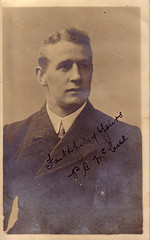Rugby league club career
Along with fourteen of his Olympic Wallaby teammates, on his return to Australia, he negotiated to take part in promotional matches against the Pioneer Kangaroos. He was promptly banned from the amateur code by the Metropolitan Rugby Union. McCue and a number of the rebels joined the Newtown club in Sydney in 1910. They included gold medallist Wallabies John "Jumbo" Barnett and Charles "Boxer" Russell. He helped the club win premiership honours that year, playing at second-row forward in the 1910 NSWRFL season's final.
McCue played seven seasons with Newtown and after retiring as a player was assistant coach of the University club in its inaugural first grade season of 1920. He later returned to rugby union, coaching the University rugby union team in seasons 1926, 1927, 1932, 1935, 1942, 1943 and 1944. [5] Paddy McCue was the elder brother of Jim McCue, who also played with Newtown between 1911 and 1919.
In 2008, the centenary year of rugby league in Australia, McCue was named in the Newtown Jets 18-man team of the century.
This page is based on this
Wikipedia article Text is available under the
CC BY-SA 4.0 license; additional terms may apply.
Images, videos and audio are available under their respective licenses.


